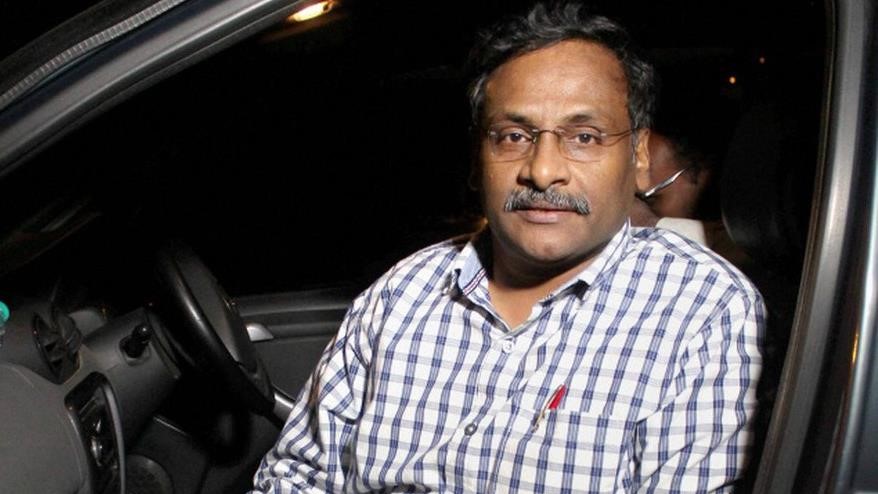Lee en español aquí
The Nagpur Bench of the Bombay High Court acquitted former Delhi University professor and activist G.N. Saibaba on March 5, 10 years he was arrested and jailed on allegations of ties with the banned Communist Party of India (Maoist). Saibaba, who is wheelchair-bound and is 90% disabled, was arrested in May 2014.
In 2017, a trial court convicted Saibaba and five others — journalist Prashant Rahi, Mahesh Tirki, Hem Keshwdatta Mishra, Vijay Nan Tirki, and Pandu Narote — under various sections of the draconian anti-terror Unlawful Activities (Prevention) Act) and the Indian Penal Code (IPC). They were accused of having ties to the Revolutionary Democratic Front (RDF), an organization alleged to be a front for the banned CPI (Maoist).
Saibaba, Rahi, Mahesh Tirki, and Mishra were sentenced to life imprisonment and Vijay Tirki was handed a ten-year sentence for engaging in actions tantamount to “waging war” against India. Saibaba was imprisoned at the Nagpur Central Jail, first as an under-trial prisoner, and then after his conviction. During this time, he was also placed in solitary confinement in the facility’s “Anda Cell” — a name for windowless cells located in the jail’s maximum security zone.
Pandu Narote, imprisoned alongside Saibaba, died in jail on August 25, 2022 after he had contracted swine flu. His lawyers stated that prison authorities had not provided him with medical care on time, and that he was “already dying” by the time he was shifted to a hospital.
Saibaba himself has suffered from several serious health ailments, and was in and out of jail on medical bail multiple times. “It looks like they [government and police] wanted to silently kill me with my own ailments. They may not have shot me down but they wanted to kill me like this,” he had told The Hindu in 2016.
“They are scared of my activism. They have repeatedly told me that because of my campaigns, particularly on adivasi [Indigenous tribal peoples] issues, the government was suffering embarrassment. I was warned about it several times even before my arrest. I was told clearly that I would be arrested if I don’t stop.”
Saibaba’s imprisonment also drew international attention, including multiple statements by UN experts. In 2023, UN Special Rapporteur on the situation of human rights defenders, Mary Lawlor, had stated that his “continued detention is shameful. It bears all the hallmarks of a State seeking to silence a critical voice.”
In October 2022, the Nagpur bench of the Bombay High Court acquitted Saibaba, Narote, and the other four people in the case. The court noted that the trial court had undertaken the proceedings against the six without a sanction for prosecution from the central government, as required by the UAPA, and declared the sanction order invalid. The court added that due process must not be violated for a “perceived peril to national security.”
In the case of Saibaba, the sanction order was dated over a month after the trial court had already framed charges. Meanwhile, in the case of the others, the independent assessment required by the central government to issue a sanction did not contain any reasons for the sanction.
While Saibaba and others were awaiting release, the Maharashtra state government approached the Supreme Court seeking a stay on the release order.
Within 24 hours, a special bench of the apex court was convened on a Saturday (a holiday for the court) which went on to suspend the Bombay High Court’s decision. Saibaba was the only person accused in the case present in court and the timing and the decision itself were seriously questioned by legal experts in the country. Subsequently, the Supreme Court sent the case back to the Bombay High Court for a fresh hearing.
On March 5, Saibaba and others were acquitted by the court for a second time.
In its ruling on Tuesday, the High Court stated that there had been “total non-compliance of various provisions of UAPA,” stating that the sanction orders for the first five in the case was invalid and, specifically, the “taking of cognizance by the Trial Court without valid sanction or no sanction” went to the “root of the case, which renders the entire proceedings null and void.”
Prior to his arrest in 2014, a joint police and intelligence team had seized electronic and written materials from Saibaba during a raid at his residence. In the subsequent 2017 conviction, he was convicted for the “possession of naxal [a term used to refer to the Maoist groups] literature, pamphlets, letters, correspondence, audio-video, electronic materials which were to be used for inciting the people to create violence to cause public disorder.”
In its ruling, the Court stated that the prosecution had failed to prove the seizure and search of “incriminating materials” by providing credible evidence, while also highlighting other issues with the raid itself.
The Court further stated that if a citizen downloads materials and videos related to Communist or Naxal philosophy “or even sympathizes with the philosophy,” it would in itself not be an offense unless specific evidence could connect “an active role shown by the accused with particular incidents of violence and terrorism.”
“No evidence has been led by the prosecution by any witness to any incident, attack, act of violence…in order to connect the accused to such act, either by participating in its preparation or its direction or in any manner providing support to its commission,” the judges stated.
Soon after, the Maharashtra state government filed an application with the court seeking a six-week stay on the release order, stating that it had approached the Supreme Court to challenge the verdict. The High Court dismissed the application.
Saibaba is now awaiting his release from the Nagpur Central Jail. “After 10 long years of struggle, justice is finally delivered. I only hope there are no future obstacles to his very well-deserved freedom,” his wife, Vasantha Kumari said in a statement as per The Wire.





